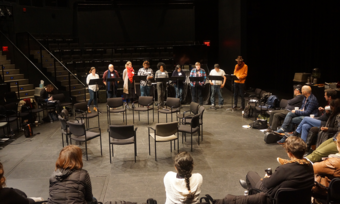Limited Opportunities
Efforts to diversify the performing arts industry frequently center around who is performing on our stages, who is writing the plays, and what demographic groups are represented in the stories told. In addition to this, we must think about who the people funding, managing, representing, and marketing our productions are. The limited number of paid internship opportunities in these areas is an indicator of how we, as an industry, are making arts administration an inaccessible career path for young people who do not come from a certain level of privilege.
Playbill provides a list of over one hundred theatrical internships people can apply for, which includes internship opportunities in both non- and for-profit companies across the United States. However, of the 136 opportunities, 90 are explicitly listed as unpaid. Of the 46 internships listed as paid, only 5 organizations are represented and they are all in New York City; for the unpaid internships, more than 15 organizations in 7 different states are represented. So, you can either get hired by City Center, Jujamcyn, Lincoln Center, Manhattan Theatre Club, or Roundabout (and get yourself to NYC and find a place to live), or you enter the land of unpaid internships. One more hurdle: the organizations that provide paid internships get such a high quantity of applications that they often filter out people who do not have previous internship experience.
Internships are primarily going to people of a certain socioeconomic class, and those young professionals are coming out of the experience with an upper hand against their competition.
Increasing Accessibility
The correlation between race, wealth, and social capital in the United States is well established. In February 2019, the National Center for Education Statistics published a report called “Status and Trends in the Education of Racial and Ethnic Groups,” which states that, as of 2016, the following percentages of children under the age of eighteen were in families living in poverty: 31 percent of Black children, 26 percent of Hispanic children, 10 percent of Asian children, and 10 percent of white children. In the United States, African Americans have historically been denied wealth, and a tremendous racial wealth gap remains today. According to a recent publication by Citylab, “on average, white households have nearly 6.5 times the wealth of black households.” To truly diversify the performing arts administration field, we need to make it accessible to students of low socioeconomic status.
For the organizations paying their interns a reasonable wage, government and institutional funding is key. Manhattan Theatre Club (MTC) seems to have it figured out; their internship program, the Paul A. Kaplan Theatre Management Program, is funded by Bank of America Charitable Foundation, Rita J. and Stanley H. Kaplan Family Foundation, and New York State Council on the Arts with the support of Governor Andrew M. Cuomo and the New York State Legislature. Wade T. Handy, the associate director of education at MTC, explained: “It is an institutional priority that our internship program be competitive and attractive to a wide range of candidates. The current structure, implemented in the 2015–16 season, indexes intern pay to New York City’s minimum wage.”
The organization pays their full-time interns $525/week and part-time interns $15/hour. In addition, candidates from historically underrepresented communities can apply for a “living allowance” of $150/week if they’re full-time or $75/week if they’re part-time. This is a need-based opportunity with an application process that is completely independent of the internship application process. Handy explained that funding for MTC’s internship program varies from year to year; while there is some dedicated funding, the organization is constantly researching other prospective sources, and the remainder has to be covered by MTC’s annual operating budget.
Putting Values into Action
In order for the performing arts industry to tackle the systemic exclusion of people from distressed communities, organizations must recognize the correlation between unpaid internship programs and the lack of diversity in the industry and then prioritize the accessibility of these educational and professional programs. The primary roadblock is clearly funding, but if an organization is committed to building a more inclusive, diverse, and equitable industry, the resources are allotted to their internship programs should be a demonstration of these values.
If an organization is committed to building a more inclusive, diverse, and equitable industry, the resources are allotted to their internship programs should be a demonstration of these values.
This challenge is not unique to performing arts administration. Handy shared that MTC is continuously looking at how other arts and cultural organizations are structuring their programs for early career professionals and navigating the challenges. In the last year, Art + Museum Transparency, a group of art and museum workers, drew attention to the unpaid internship culture in their industry by initiating crowd-sourced salary and internship transparency spreadsheets. The group, founded by Michelle Millar Fisher, curator of contemporary decorative arts at the Museum of Fine Arts Boston, told Art New News that their natural and urgent next step is to address unpaid internships. In June, the Association of Art Museum Directors (AAMD) passed a resolution calling for art museums to start paying their interns.
The resolution acknowledges that “internships provide critical opportunities for students considering careers in art museums, as well as experience necessary for entering the workforce” and “paid internships are essential to increasing access and equity for the museum profession.” It recommends that art museums should pay interns, except in special circumstances justifying such an arrangement. An annotation clarifies that these special circumstances apply to situations where students are receiving academic credit for their internship and are not eligible to get paid. Could the theatre industry create a similar resolution? Associations such as the Broadway League and the League of Resident Theatres could promote these values.












Comments
The article is just the start of the conversation—we want to know what you think about this subject, too! HowlRound is a space for knowledge-sharing, and we welcome spirited, thoughtful, and on-topic dialogue. Find our full comments policy here